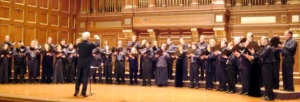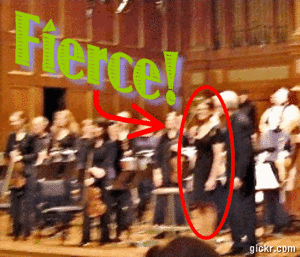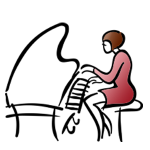Cantata Singers
Friday, January 14th
Music of Elgar, Finzi, Holst and Vaughan Williams
When you go to a Cantata Singers concert, you can always be assured that the programming will be interesting and the performance standards will be high. For example, McDoc and I agreed that the diction was excellent on Friday evening (kudos to vocal and diction coach extraordinaire, Alison Voth!). But the performance went far beyond simply being well-done. From the opening tenor line of Gustav Holst‘s The Evening-watch to the closing orchestral chords of Ralph Vaughan Williams‘ Riders to the Sea, there was a palpable sense of magic in Jordan Hall.
While listening to that tenor line, by the way, I felt a sudden, deep desire to go home and write some choral music. That pure musical impulse is a rare and beautiful thing. Too often, it gets toxically diluted with guilt or envy, as in, “Oh, if only I could write something as good – I’d better go try!” or, “I can do that, and even better, and I’ll prove it!” Anything that rekindles one’s love of music is a precious gift. As far as I was concerned, Cantata Singers had done their job within about eight notes.
Lucky for all of us, though, they didn’t stop there!
The first half of the program consisted of unaccompanied choral works, adding fellow early 20th-century English composers Edward Elgar and Gerald Finzi to Holst and Vaughan Williams (the featured composer for Cantata Singers’ current season). The two Elgar pieces, Weary Wind of the West and The Prince of Sleep were beautiful, and beautifully sung, though they sounded a touch old-fashioned to me after Holst’s open-fourth-based harmonies. But the texts of these first three pieces united them, with repeated images of stillness and sleep. (I wonder why poets like to write about sleep so much, and why singers like to sing about it?)
The centerpiece of this group was Vaughan Williams’ Three Shakespeare Songs, which were lively and charming. I enjoyed the onomatopoeia of the repeated “ding-dong” figures in “Full Fathom Five,” on a text from Act I of The Tempest. “The Cloud-Capp’d Towers,” from Act IV, included the famous lines,
We are such stuff
As dreams are made on, and our little life
Is rounded with a sleep.
…continuing the sleep theme! I was struck by the harmonic shift at the very end of this piece, which reminded me of the final “Amen” of Benjamin Britten‘s War Requiem, composed ten years later.
Three folksong arrangements completed the first half of the program: Vaughan Williams’ “Loch Lomond,” for tenors and basses, featuring tenor soloist Richard Simpson, and Holst’s “My Sweetheart’s like Venus” and “I Love My Love.” One might worry that “Loch Lomond” (“Oh, you’ll take the high road, and I’ll take the low road, And I’ll be in Scotland afore ye…) would risk sounding trite and sentimental, but I found this performance warm and appealing.
At any good choral performance, you can usually tell by looking at the choir members that they enjoy what they’re doing. But here especially, you could see, hear and feel their love for the music in their facial expressions and physical presence. You could feel that the audience was enthralled, too – there was an audible group sigh at the conclusion of each piece.
When the first half ended, I was so transported that I found it hard to imagine taking in anything more. But I was curious about Riders to the Sea. Vaughan Williams called it a music-drama, which is a term composers use when, for one reason or another, they aren’t quite comfortable calling something an opera. And indeed, it lacks certain features one might expect from an opera, like a love story or stand-alone arias. It does have tragedy, but unlike a typical opera that begins with love and ends in tragedy, this piece is tragedy all the way.
Riders to the Sea, based on the play by J. M. Synge (best known for another play, The Playboy of the Western World is set on an island off the West coast of Ireland. Its central character is Maurya, who has lost a husband and four sons to the sea. When the piece opens, her fifth son is missing, and she tries to dissuade her sixth and last son from sailing for Galway. By the end, her fears prove to be well-founded.
If you just read the libretto, you can’t help but find the whole affair unrelentingly woeful:
MAURYA: They are all gone now, and there isn’t anything more the sea can do to me…. I’ll have no call now to be up crying and praying when the wind breaks from the south… I’ll have no call now to be going down and getting Holy Water in the dark nights after Samhain, and I won’t care what way the sea is when the other women will be keening.
But Vaughan Williams’ sensitive treatment of the text adds another dimension, ennobling the works humble characters by honoring their human experience of fear, loss and facing mortality, our own and that of our loved ones. The music becomes more peaceful and transcendent toward the end, even as the words march toward resignation.
The soloists – Lynn Torgove as Maurya, Lisa Lynch as Nora, Claire Filer as Cathleen and Brian Church as Bartley – performed their roles with focus and commitment, and the semi-staged production was an unexpected theatrical treat at a choral performance.
Speaking of the theatrical element, conductor David Hoose brought stage director Alexandra Borrie on stage for a well-deserved bow after the performance concluded, and I couldn’t help but notice with soem envy the fabulous dress she wore. I didn’t get a clear enough photo, but you’ll just have to take my word for it that this little black cocktail dress with its asymmetrical cut-out neckline was…
Seriously, though, either of the two halves of this program were worth the price of admission alone. If you’re in the Boston area and have an opportunity to hear Cantata Singers, do not pass it up!
Miss Music Nerd Recommends:
Vaughan Williams: Riders to the Sea; Flos Campi; Household Music
There Is Sweet Music: English Choral Songs, 1890 – 1950
Gustav Holst: The Evening Watch and other choral music








